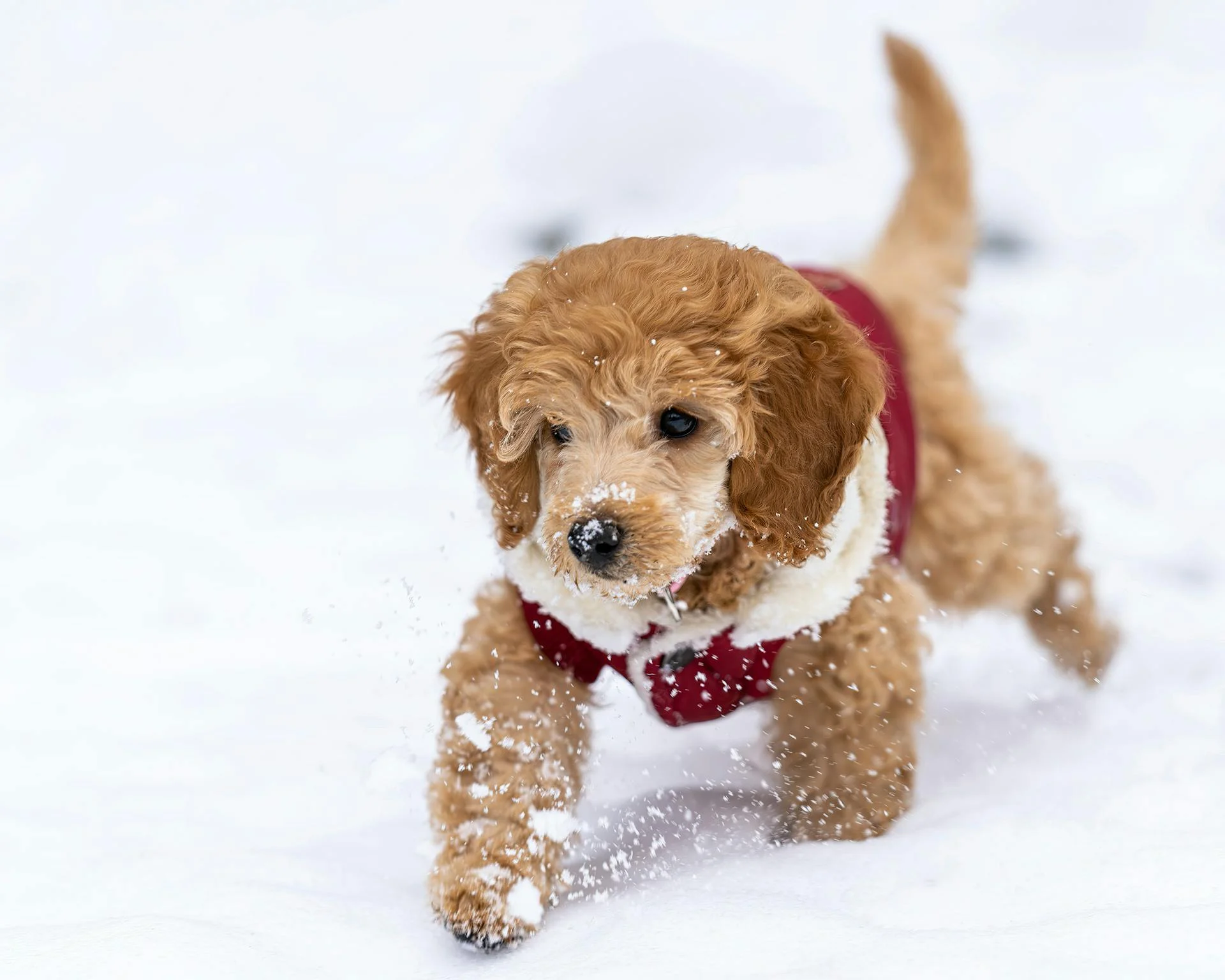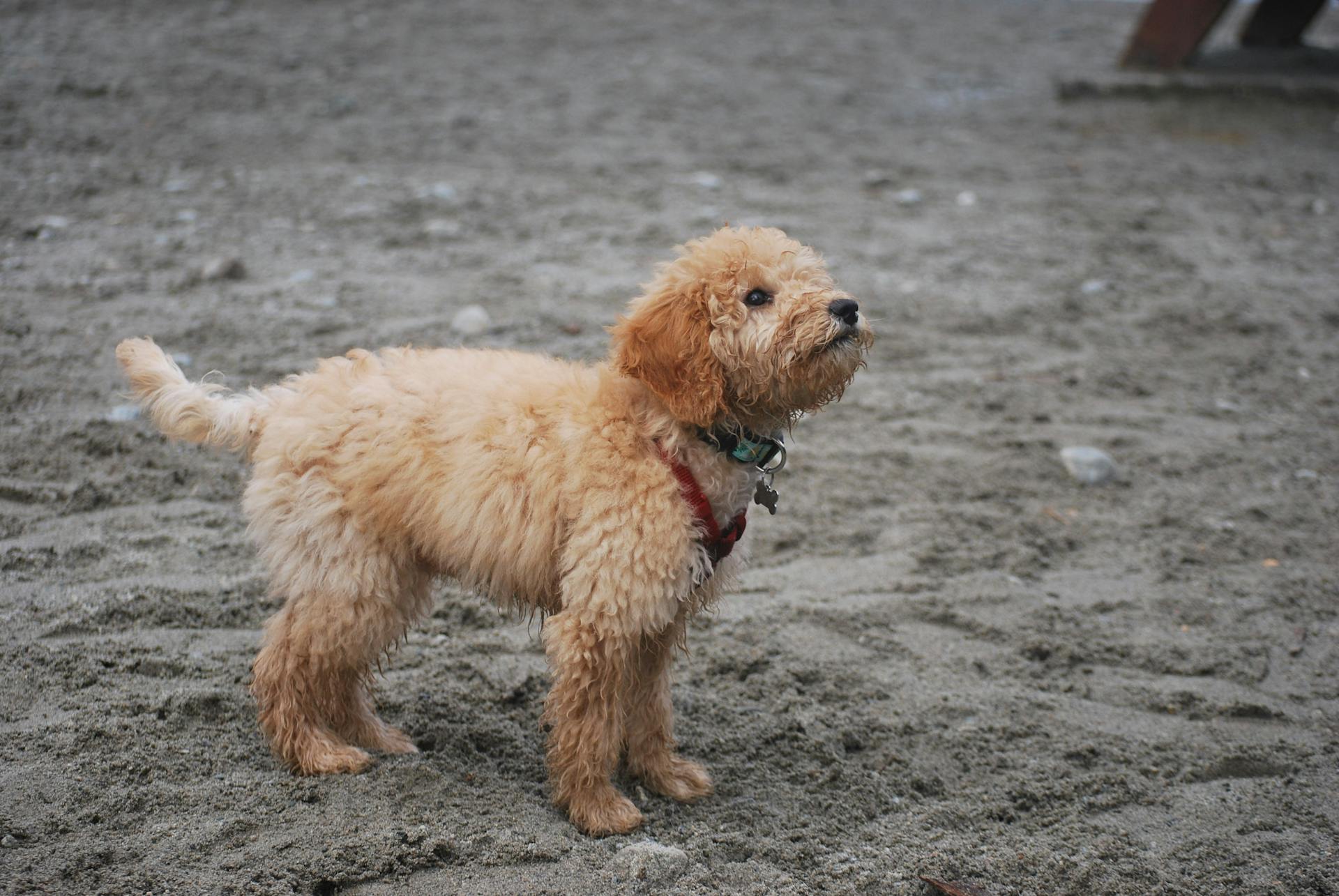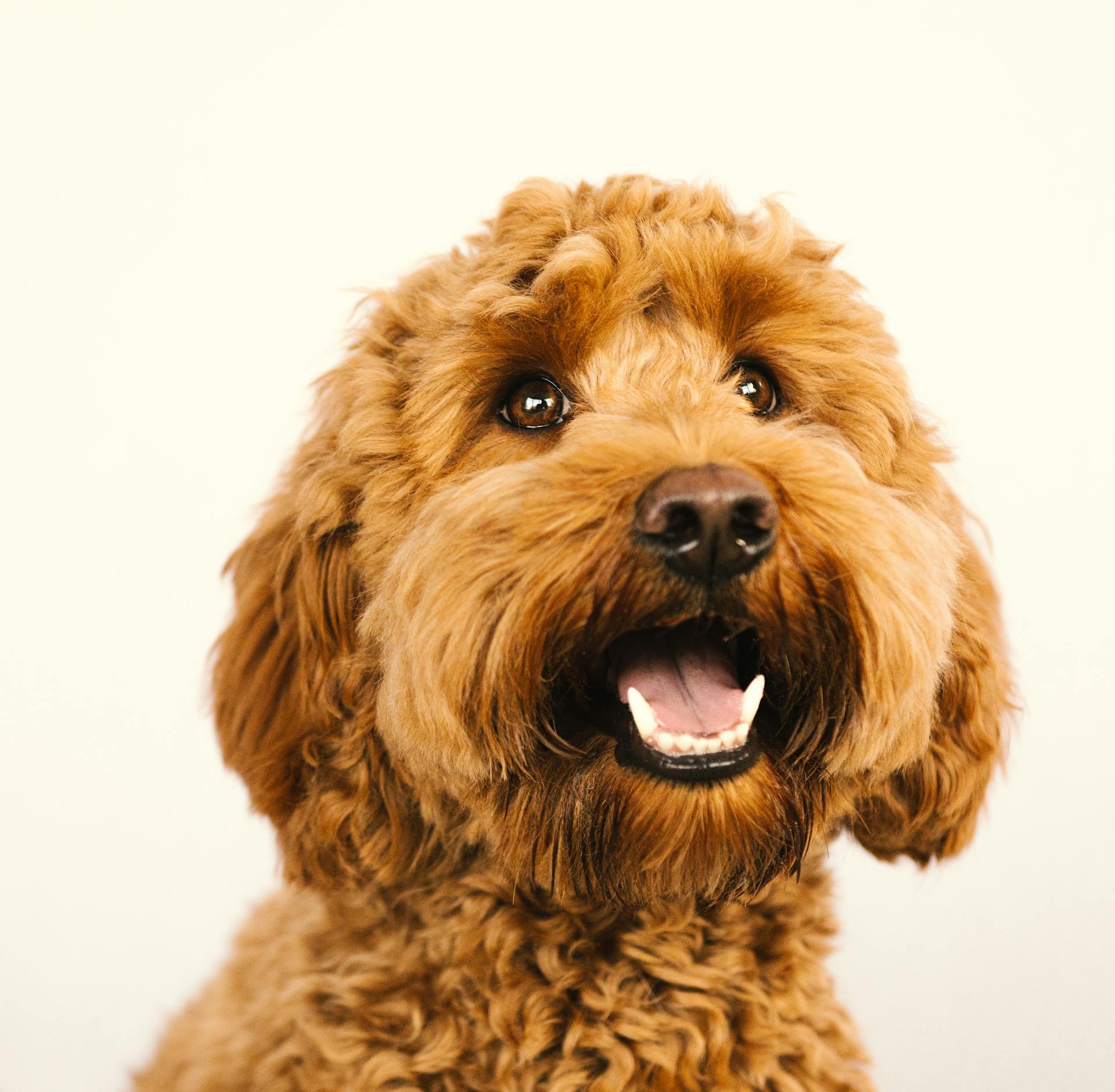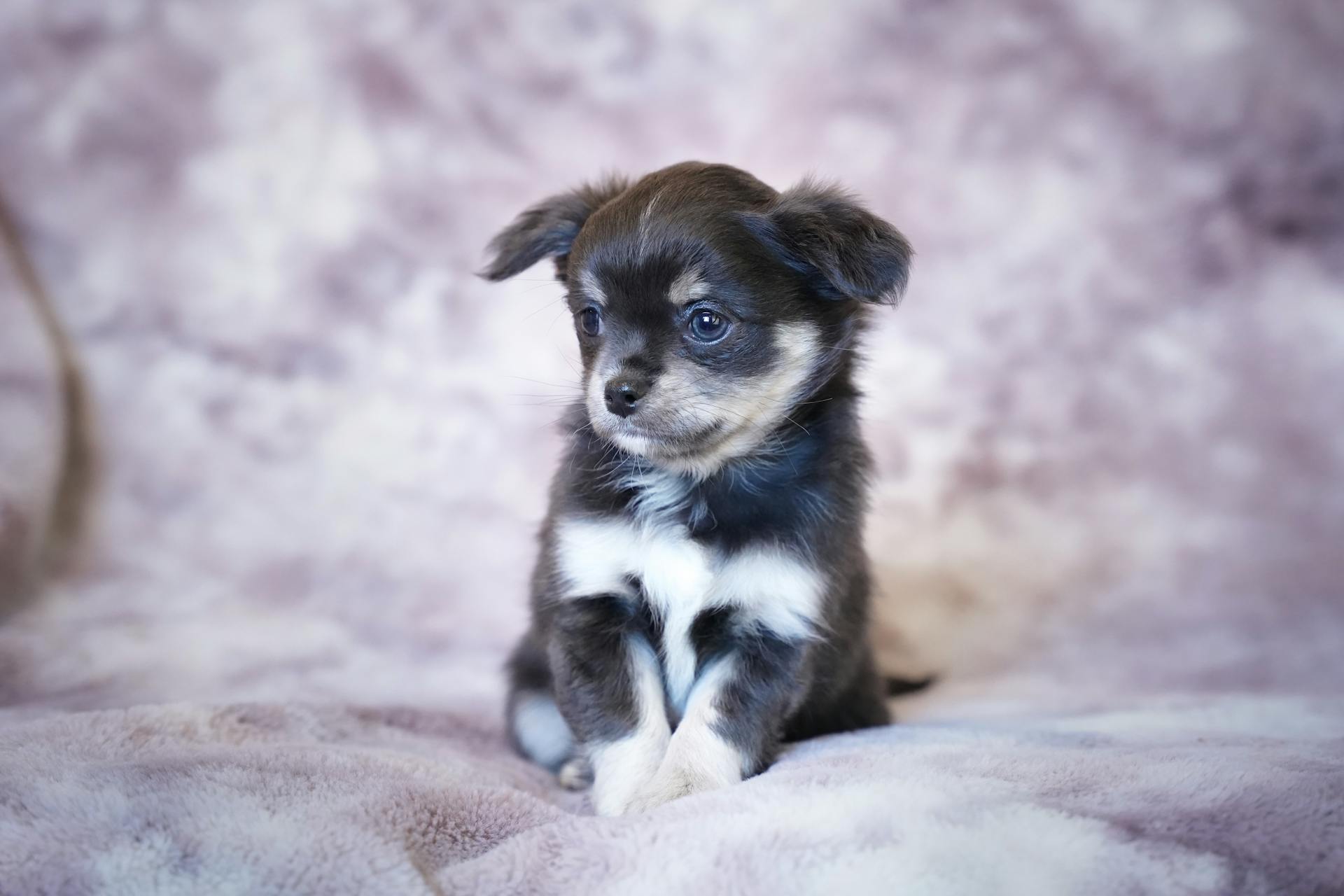
Standard Goldendoodles are a popular breed, but their health, nutrition, and care requirements are often misunderstood. They need regular exercise to stay happy and healthy.
To maintain a healthy weight, Standard Goldendoodles require at least 30 minutes of exercise per day, which can include walks, runs, and playtime in the yard. This helps prevent obesity and related health issues.
A well-balanced diet is essential for Standard Goldendoodles, and they thrive on high-quality dog food that's rich in protein and fiber. A good rule of thumb is to feed them 3-4 cups of food per day, divided into two meals.
Standard Goldendoodles are prone to hip dysplasia, so it's crucial to monitor their joint health and provide regular check-ups with a veterinarian.
Recommended read: What Do Most Goldendoodles Die from
Health and Nutrition
A balanced diet is essential for your Goldendoodle's health, so make sure to feed them high-quality dog food in the right amounts. Fresh water should always be available.
Excess protein and calories can lead to obesity and kidney issues, so it's best to stick to a complete and balanced commercial food diet. Treats should make up only 10% of your dog's calorie intake and never replace a meal.
To determine the right amount of food for your Goldendoodle, consult with your veterinarian, who will assess your pup's lifestyle, health, and breed to determine daily kilocalorie needs.
If this caught your attention, see: Are Goldendoodles Expensive
Health Issues

Goldendoodles are generally healthy dogs, but they can be prone to certain health issues. They can live up to 10-15 years with proper care.
To ensure your Goldendoodle stays healthy, it's essential to purchase from a reputable breeder. A good breeder will thoroughly test their breeding stock for health problems.
Goldendoodles may develop health conditions common to both Golden Retrievers and Poodles. These include hip dysplasia, a skin disease called sebaceous adenitis, and heart conditions like subvalvular aortic stenosis.
Hip dysplasia is a common issue for large- and giant-breed dogs, including Goldendoodles. It happens when the hip joint develops abnormally, resulting in a loose joint.
Discomfort from hip dysplasia can manifest in various ways, such as reduced activity, difficulty going up stairs, or even difficulty getting up. Treatment options range from nutrition supplements to anti-inflammatory medications to surgery.
Other health issues that may affect Goldendoodles include Addison's disease, eye diseases like progressive retinal atrophy, cataracts, and glaucoma. These conditions can be costly to diagnose and treat.

Here's a breakdown of the estimated costs associated with some of these health issues:
Protecting yourself from costly vet bills is crucial. Consider purchasing pet insurance for your Goldendoodle before they show symptoms or are diagnosed with a health issue.
Nutritional Tips
A balanced diet is key to your Goldendoodle's overall health, so make sure they eat the right amount of high-quality dog food and always have access to fresh water.
Excess protein and calories can lead to obesity and kidney issues, so don't overdo it with treats - they should make up only 10% of your dog's calorie intake.
It's also essential to pick a food that's catered to your Goldendoodle's life stage, whether they're a puppy, adult, or senior.
Unless recommended by a veterinarian, your dog shouldn't need any nutritional supplements, so stick with a complete and balanced commercial food diet.
To reduce the risks of heart disease, avoid feeding your dog grain-free and boutique brand foods - instead, look for Association of American Feed Control Officials-compliant dog foods.
Check this out: Standard Sausage Dog
Feeding your Goldendoodle smaller amounts, at least twice daily, can help reduce the likelihood of life-threatening gastric dilatation and volvulus, or GDV.
To determine the right amount of food for your Goldendoodle, chat with your veterinarian, who will assess your pup's lifestyle, health, and breed to determine their daily kilocalorie needs.
Goldendoodle puppies under 6 months old should be fed a minimum of three times a day, while adult dogs should be fed twice a day, depending on their stage of life.
Grooming and Care
Standard goldendoodles require regular grooming to prevent unruly tangles and matting. Their beautiful curly coat sheds minimally, but they need constant and regular grooming, including regular brushing at home and appointments with a professional groomer every four to eight weeks.
Daily brushing is necessary to maintain a healthy coat, and it's essential to train your goldendoodle from a young age to allow for this consistent grooming. This will help prevent matting and make the grooming process much easier.
Discover more: Grooming Golden Doodles
To prevent infections in your goldendoodle's ears, keep them clean and dry, especially after a bath or a swim. It's also crucial to find a groomer specializing in goldendoodles, especially in the size you have chosen, as they will be able to provide the necessary care for your goldendoodle's tightly wound curls.
Grooming Guide
Grooming your Goldendoodle requires a high-maintenance hair care routine, including regular brushing and appointments with a professional groomer.
To avoid unruly tangles and matting, regular brushing at home is a must, and training your dog from a young age to allow for this consistent grooming is critical.
You'll need to spend a good deal of money on grooming every four to eight weeks, so factor that into your budget.
Daily brushing is necessary to maintain a healthy coat, and it's essential to find a groomer specializing in Goldendoodles, especially if you have a mini Goldendoodle that's easier to handle.
Grooming is particularly imperative for Goldendoodles with tightly wound curls, and those with looser curls or none at all still need to be groomed routinely but less frequently than those with tighter curls.
It's not recommended to groom your Goldendoodle at home, as it requires special care to ensure healthy Goldendoodle skin, even if you have a small dog.
Eye Care
Eye Care is a top priority for Goldendoodle owners. Trim your pup's bangs to ensure their voluminous locks don't block their vision.
Goldendoodles are prone to congenital eye conditions, so it's essential to keep an eye out for symptoms. Contact your veterinarian if you notice any issues.
Regular grooming can help prevent eye problems, but it's not a substitute for regular check-ups with your vet.
Ear Care
Taking good care of your Goldendoodle's ears is crucial to prevent infections. Always keep their ears clean and dry, especially after a bath or a swim.
Regular ear cleaning is essential, but be gentle to avoid causing discomfort or pain.
Behavior and Training
Standard Goldendoodles are known for their gentle temperament, making them ideal for households with kids and elders. They especially benefit from having a strong bond with their human family and being part of the daily routine.
Goldendoodles are intelligent and easily trained, excelling in activities like agility and obedience classes. They respond well to positive reinforcement techniques, using treats to reward good behavior.
To train your Goldendoodle effectively, it's essential to start early, teaching good habits that will last throughout their lifetime. With patience and consistency, you'll be able to teach your Goldendoodle many tricks and commands.
You might like: Are Goldendoodles Good Family Dogs
14 Cute Facts
Here are 14 cute facts to keep in mind when it comes to behavior and training.
Dogs are able to understand over 1,000 words, including gestures and tone of voice.
They can learn to recognize and respond to hundreds of commands.
Puppies start learning from day one, with their brains developing rapidly in the first few months.
Their ability to absorb information is impressive, but also exhausting for their owners.
A study found that dogs can learn to perform tasks in as little as 5-10 repetitions.
Consistency is key when training your furry friend.
Dogs have a unique sense of smell, with some breeds able to detect scents 10,000 times more sensitive than humans.
Their sense of smell plays a huge role in learning and behavior.
Positive reinforcement training is a highly effective method for teaching dogs new behaviors.
It focuses on rewarding good behavior rather than punishing bad behavior.
Dogs are highly social animals and thrive on interaction with their human family members.
They can become depressed if left alone for too long.
A dog's attention span is relatively short, lasting around 2-3 minutes.
Training sessions should be short and frequent.
Dogs are able to learn through observation, often mimicking the behaviors of their owners.
This is why consistency is so important when training your dog.
A study found that dogs are able to learn to recognize and respond to up to 100 different commands.
Explore further: When Did Goldendoodles Start
The key is to start with simple commands and gradually increase complexity.
Dogs are able to learn at any age, with some breeds even learning new tricks in their senior years.
Consistency and patience are essential for successful training.
Dogs are highly intelligent animals, ranking among the top 5 most intelligent species.
Their ability to learn and problem-solve is impressive.
Behavior and Training
Goldendoodles are intelligent and easily trained, making them excel in activities like agility and obedience classes. They respond well to positive reinforcement techniques, using treats to reward good behavior.
They are prone to separation anxiety if they don't receive the proper amount of social stimulation, so pet parents should avoid leaving them at home alone for too long.
Goldendoodle puppies should be trained at a very young age to ensure they develop good habits that will last throughout their lifetime and minimize mischievous behavior.
With patience and consistency, you can teach your Goldendoodle many tricks and commands, but be careful not to be outsmarted by their cleverness.
They are highly intelligent dogs that can easily train their owners to suit their own purposes, so it's essential to use positive-reinforcement training methods.
Large dogs may require more intensive training to teach them how to avoid damage to the interior of your home, which means longer training sessions may be necessary.
Mini Goldendoodles tend to be sassier than medium-sized Goldendoodles, which may require a more stringent training protocol to get them to behave appropriately.
They are generally good around cats and children, but there may be some initial adjustment period as they get used to new family members.
Goldendoodles require 30-60 minutes of physical exercise per day, which can encompass a combination of walks, runs, hikes, and playtime.
Standard and Medium Doodles Better with Children Than Miniature
Standard and medium goldendoodles are often a better match for families with children. They tend to be more patient and gentle with kids, making them a great choice for families.
In fact, miniature goldendoodles may feel overwhelmed by the excitement of small children. This is because kids can sometimes handle them more roughly than adults.
Standard-sized goldendoodles, on the other hand, are often lovable and easy-going, making it easier for small children to snuggle with them.
Pet Care Considerations
Goldendoodles are highly intelligent and do well in obedience classes and agility training. They require ample amounts of training and exercise every day, particularly in their early puppy years, to stay entertained, tired, and happy.
To prevent separation anxiety, it's essential to provide your Goldendoodle with plenty of social activity every day. Leaving them alone at home for long periods of time, more than eight hours, can lead to anxiety issues.
Goldendoodles thrive in households with yards and plenty of room to roam, making them an ideal companion for any family.
Pet Care Considerations
Goldendoodles require ample amounts of training and exercise every day, particularly in their early puppy years, to stay entertained, tired, and happy.
They can live in any type of home but prefer one with a yard and plenty of room to roam. Goldendoodles are very intelligent and do well in obedience classes and agility training.
Pet parents should ensure their Doodle gets plenty of social activity every day to prevent separation anxiety. This can be achieved by providing them with regular interaction and playtime with family members and other pets.
Leaving Goldendoodles alone at home for more than eight hours can lead to anxiety and frustration. So, it's essential to make arrangements for their care during the day, such as hiring a dog walker or asking a neighbor for help.
Goldendoodles are prone to becoming easily excitable, mouthy, and frustrated if they don't receive proper training and attention. Positive-reinforcement training is the best approach to ensure they develop good behavior and a happy temperament.
Pet Insurance for
Pet insurance can be a lifesaver for unexpected vet bills, but it's essential to choose the right plan for your furry friend. Pet insurance for Goldendoodles, for example, costs more than for mixed breed dogs.
Pet insurance plans like Embrace offer full coverage for breed-specific conditions that Goldendoodles are susceptible to, excluding pre-existing conditions.
The best time to get pet insurance is when your dog is a healthy puppy, as you can't predict the future and pet insurance is one thing you can't get when you need it most.
Additional reading: What Are Golden Doodles Mixed with
Choosing a Goldendoodle
Goldendoodles come in various sizes, including toy, miniature, and standard. Standard Goldendoodles typically weigh between 50 and 90 pounds.
Consider your lifestyle and living situation before choosing a Goldendoodle. If you live in a small apartment, a toy or miniature Goldendoodle may be a better fit.
Standard Goldendoodles are generally good with children, but as with any breed, it's essential to socialize them properly. They are also relatively low-maintenance when it comes to grooming.
Standard Goldendoodles can be prone to health issues such as hip dysplasia and eye problems. Regular veterinary check-ups can help identify these issues early on.
Goldendoodles are highly intelligent and easily trainable, making them a great choice for first-time dog owners. With patience and consistency, they can learn a wide range of commands and behaviors.
Check this out: Images of Miniature Goldendoodles
Doodle Sizes and Care
A standard goldendoodle can grow up to 22 inches tall, making them a great match for someone who wants a dog with a larger appearance and a sweet temperament.
Standard goldendoodles need more space to roam inside and out, so they're perfect for people with spacious homes and plenty of outdoor acreage.
They're also more energetic than mini goldendoodles and can go on runs, take swims, or engage in other forms of outdoor exercise with ease.
Standard goldendoodles require a bigger leash and collar or even a harness, which can be more expensive than the leash and collar necessary for smaller dogs.
You'll also need to consider a bigger crate for your standard goldendoodle, one that allows plenty of room for your pup to stand up, stretch its paws, and move around comfortably.
Three Sizes
Goldendoodles come in three sizes: miniature, medium, and standard. Each size category is measured at the doodle's full maturation.
A mini goldendoodle is perfect for small spaces like condos or apartments. Standard goldendoodles need more space to roam, making them ideal for people with spacious homes and plenty of outdoor acreage.
Medium goldendoodles are an optimal choice for someone looking for a dog larger than the mini goldendoodle size but still adaptable to smaller spaces. They're also more cost-effective than mini goldendoodles.
Mini goldendoodles rely on more frequent bursts of activity throughout the day due to their lower stamina. They exhibit more energy common in the poodle portion of their lineage.
Standard goldendoodles can grow up to 22 inches tall, making them a good match for someone who wants a larger dog with a sweet temperament. They're also a good choice for outdoor enthusiasts who want a dog that can accompany them.
The standard doodle size is anything over 21 inches weighing 51 pounds or more. There's typically not much of a weight difference between male and female doodles, though this depends on the parents.
Standard and medium goldendoodles are typically better with children than miniature goldendoodles. Miniature goldendoodles may feel overwhelmed by the excitement of small children.
Explore further: Medium Goldendoodles
Medium Doodles
Medium Doodles are an optimal size for a working or family dog, measuring between 17 and 21 inches and weighing between 35 and 50 pounds.
They're easy to walk on a leash and enjoy playing outdoors, making them a great choice for families who love spending time together. Medium goldendoodles can also fit pretty easily in a smaller living space.
Their adequate center of gravity makes them perfect for long car rides, and they enjoy traveling more than mini goldendoodles. This is especially great for families who love taking road trips.
Medium goldendoodles are relatively easy to pick up if needed, making them a great choice for owners who want lap love from their doodle.
If this caught your attention, see: Are Goldendoodles Easy to Train
Frequently Asked Questions
What are the three types of Goldendoodles?
There are three main types of Goldendoodles: Standard, Miniature, and Petite/Toy, each with unique characteristics. Discover the differences between these sizes to find the perfect Goldendoodle for you.
What is the difference between a medium and standard Goldendoodle?
A Medium Goldendoodle is smaller than a Standard Goldendoodle, standing 18-21 inches tall and weighing 35-55 pounds, while a Standard Goldendoodle is generally larger. The key difference lies in their size, with Medium Goldendoodles being a great option for families with smaller living spaces.
Sources
- https://www.thesprucepets.com/goldendoodle-dogs-and-puppies-4169955
- https://www.petmd.com/dog/breeds/goldendoodle
- https://www.embracepetinsurance.com/dog-breeds/goldendoodle-(photos)
- https://www.jennaleedoodles.com/post/mini-goldendoodle-vs-medium-goldendoodle-vs-standard-goldendoodle
- https://www.prideandprejudoodles.com/goldendoodle-size-comparison/
Featured Images: pexels.com

